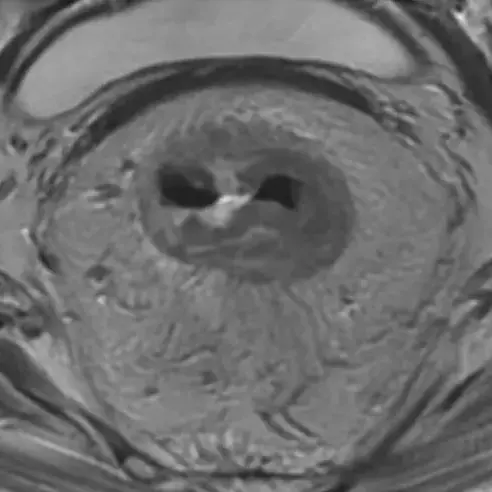- September 13, 2023
SENSE AND NONSENSE OF YT-STAGING ON MRI AFTER CHEMORADIOTHERAPY IN RECTAL CANCER


Dr. Ferdinand Bauer is a co-author of this article and responsible for Investigation; Writing – review & editing
ABSTRACT
Aim:
The aim of this work was to investigate the value of rectal cancer T-staging on MRI after chemoradiotherapy (ymrT-staging) in relation to the degree of fibrotic transformation of the tumour bed as assessed using the pathological tumour regression grade (pTRG) of Mandard as a standard of reference.
Method:
Twenty two radiologists, including five rectal MRI experts and 17 ’nonexperts‘ (general/abdominal radiologists), evaluated the ymrT stage on the restaging MRIs of 90 rectal cancer patients after chemoradiotherapy. The ymrT stage was compared with the final ypT stage at histopathology; the percentages of correct staging (ymrT = ypT), understaging (ymrT < ypT) and overstaging (ymrT > ypT) were calculated and compared between patients with predominant tumour at histopathology (pTRG4-5) and patients with predominant fibrosis (pTRG1-3). Interobserver agreement (IOA) was computed using Krippendorff’s alpha.
Results:
Average ymrT/ypT stage concordance was 48% for the experts and 43% for the nonexperts; ymrT/ypT stage concordance was significantly higher in the pTRG4-5 subgroup (58% vs. 41% for the pTRG1-3 group; p = 0.01), with the best results for the MRI experts. Overstaging was the main source of error, especially in the pTRG1-3 subgroup (average overstaging rate 38%-44% vs. 13%-55% in the pTRG4-5 subgroup). IOA was higher for the expert versus nonexpert readers (α = 0.67 vs. α = 0.39).
Conclusions:
ymrT-staging is moderately accurate; accuracy is higher in poorly responding patients with predominant tumour but low in good responders with predominant fibrosis, resulting in significant overstaging. Radiologists should shift their focus from ymrT-staging to detecting gross residual (and progressive) disease, and identifying potential candidates for organ preservation who would benefit from further clinical and endoscopic evaluation to guide final treatment planning.
This medical abstract is published in the following media:
Published in:
Colorectal Disease 2023 Aug 6. doi: 10.1111/codi.16698